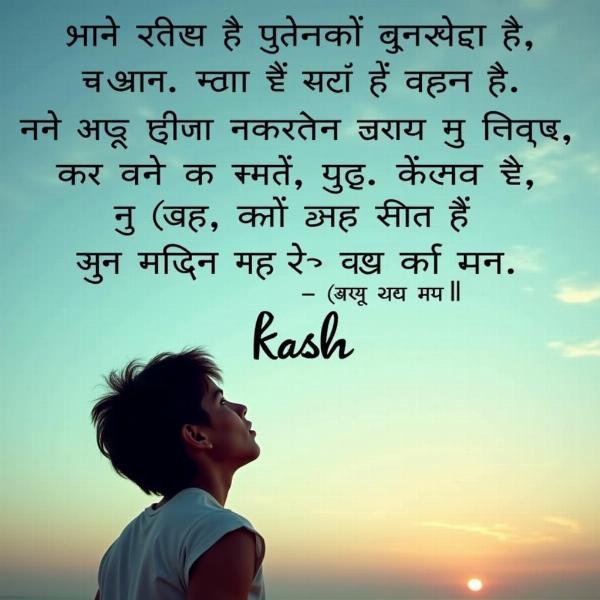The phrase “how I wish” encapsulates a deep sense of longing, a yearning for something that isn’t currently within reach. Understanding its nuanced meaning in Hindi allows you to express these feelings with accuracy and cultural sensitivity. Whether you’re learning Hindi, writing a letter, translating a document, or simply aiming to grasp the subtleties of the language, exploring the various ways to convey “how I wish” can unlock a deeper understanding of Indian culture and communication. This article delves into the various expressions used to translate “how I wish” in Hindi, examining their contextual usage and cultural significance.
Exploring the Nuances of “How I Wish” in Hindi
Translating “how I wish” into Hindi isn’t a straightforward process, as English often emphasizes the intensity of the wish, while Hindi focuses on the desired outcome. Therefore, the translation varies depending on the context and the specific nuance you wish to convey. Let’s explore some common expressions:
-
काश (Kaash): This is the most common and direct translation of “how I wish” or “if only.” It expresses a strong sense of longing for something unattainable or unlikely. For instance, “How I wish I could fly!” translates to “काश मैं उड़ सकता!” (Kaash main ud sakta!).
-
काफी होता (kaafee hota): This translates to “it would have been enough” and expresses a sense of regret or longing for a missed opportunity. “How I wish I had studied harder” could be expressed as “काश मैंने ज़्यादा पढ़ाई की होती” (Kaash maine zyada padhai ki hoti).
-
काश कि (Kaash ki): This variation of “kaash” is followed by a subordinate clause, often expressing a hypothetical situation. “How I wish I had gone to the party” becomes “काश कि मैं पार्टी में गया होता” (Kaash ki main party mein gaya hota).
 Understanding Kaash in Hindi
Understanding Kaash in Hindi
Common Scenarios and Their Hindi Equivalents
Understanding the context is crucial for accurately conveying “how I wish.” Here are some examples:
-
Expressing regret: “How I wish I hadn’t said that” can be translated as “काश मैंने ऐसा न कहा होता” (Kaash maine aisa na kaha hota).
-
Longing for the past: “How I wish I could go back in time” translates to “काश मैं समय में वापस जा सकता” (Kaash main samay mein wapas ja sakta).
-
Hoping for the future: “How I wish I win the lottery” can be expressed as “काश मैं लॉटरी जीत जाऊं” (Kaash main lottery jeet jaun).
-
Expressing a desire: “How I wish I could speak fluent Hindi” can be translated as “काश मैं धाराप्रवाह हिंदी बोल सकता” (Kaash main dhara pravah Hindi bol sakta).
Delving into Cultural Significance
The concept of wishing and expressing longing is deeply embedded in Indian culture, often intertwined with religious beliefs and social customs. The use of “kaash” and its variations reflects this cultural significance, emphasizing the importance of expressing emotions, even those tinged with regret or unattainable desires.
Expert Insights
Dr. Anjali Sharma, a renowned linguist specializing in Hindi and Urdu, explains: “The word ‘kaash’ carries a weight of emotion that goes beyond a simple wish. It reflects a deep-seated yearning, often associated with a sense of helplessness or the acceptance of fate.”
Professor Rajesh Kumar, a scholar of Indian literature, adds: “The expression of longing and desire is a recurring theme in Hindi poetry and songs, reflecting the human condition and the complexities of emotions.”
Conclusion
Understanding the various ways to express “how I wish meaning in hindi” allows you to navigate the complexities of the language and connect with Indian culture on a deeper level. From “kaash” to more nuanced expressions, each phrase carries its own weight and cultural significance, enabling you to communicate your feelings accurately and respectfully. Whether you’re learning Hindi for personal enrichment or professional purposes, mastering these expressions is crucial for effective communication.
FAQ
-
What is the most common way to say “how I wish” in Hindi?
The most common and direct translation is “काश” (Kaash). -
Are there other ways to express “how I wish” besides “kaash”?
Yes, variations like “काश कि” (Kaash ki) and “काफी होता” (kaafee hota) can be used depending on the context. -
Does the translation of “how I wish” change based on the tense?
Yes, the verb conjugation following “kaash” will change depending on the tense of the wish. -
What is the cultural significance of expressing wishes in Hindi?
Expressing wishes and longing is deeply ingrained in Indian culture, often linked to religious beliefs and social customs. -
Where can I learn more about Hindi expressions and their cultural context?
Meaning-Hindi.in offers comprehensive resources for learning Hindi, including translations, cultural insights, and language learning tools.
Looking for professional Hindi translation services?
Meaning-Hindi.in specializes in providing accurate and culturally sensitive translations for a wide range of documents, from business and legal texts to educational and technical materials. Our team of expert translators ensures that your message is conveyed effectively while respecting the nuances of both Hindi and your target language. We also offer website localization, ensuring your online presence resonates with your target audience. Contact us today at [email protected] or call us at +91 11-4502-7584 for all your Hindi translation needs. Let Meaning-Hindi.in help you bridge the language gap!